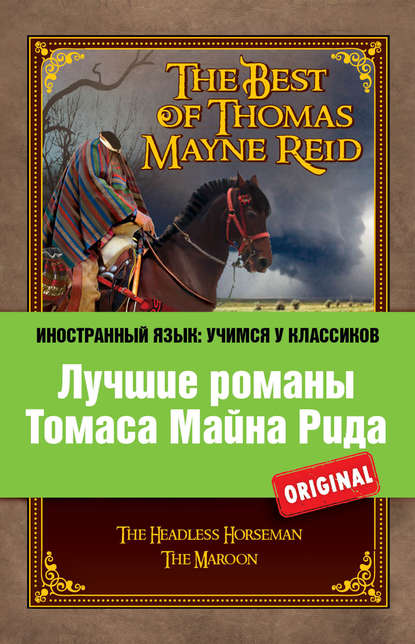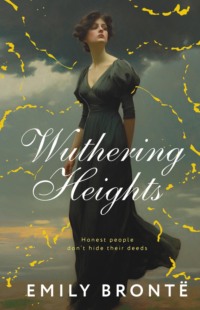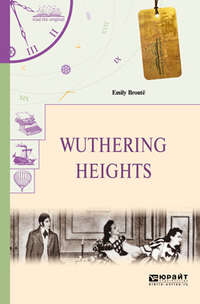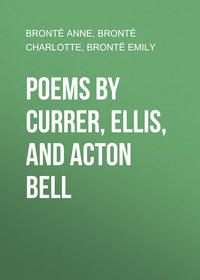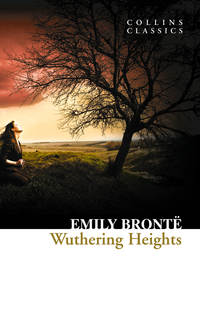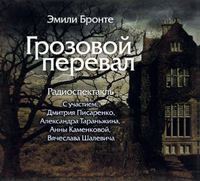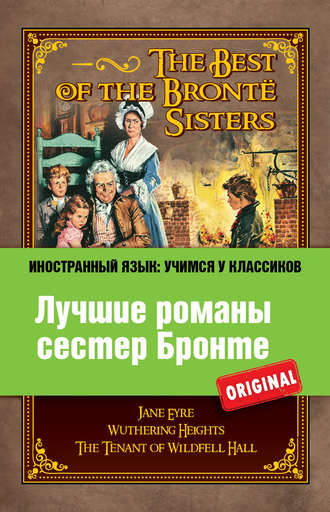
Полная версия
Лучшие романы сестер Бронте / The best of the Brontë sisters
“But you can’t get her there; there is no road to the moon: it is all air; and neither you nor she can fly.”
“Adèle, look at that field.” We were now outside Thornfield gates, and bowling lightly along the smooth road to Millcote, where the dust was well laid by the thunderstorm, and, where the low hedges and lofty timber trees on each side glistened green and rain-refreshed.
“In that field, Adèle, I was walking late one evening about a fortnight since – the evening of the day you helped me to make hay in the orchard meadows; and, as I was tired with raking swaths, I sat down to rest me on a stile; and there I took out a little book and a pencil, and began to write about a misfortune that befell me long ago, and a wish I had for happy days to come: I was writing away very fast, though daylight was fading from the leaf, when something came up the path and stopped two yards off me. I looked at it. It was a little thing with a veil of gossamer on its head. I beckoned it to come near me; it stood soon at my knee. I never spoke to it, and it never spoke to me, in words; but I read its eyes, and it read mine; and our speechless colloquy was to this effect –
“It was a fairy, and come from Elf-land, it said; and its errand was to make me happy: I must go with it out of the common world to a lonely place – such as the moon, for instance – and it nodded its head towards her horn, rising over Hay-hill: it told me of the alabaster cave and silver vale where we might live. I said I should like to go; but reminded it, as you did me, that I had no wings to fly.
“‘Oh,’ returned the fairy, ‘that does not signify! Here is a talisman will remove all difficulties;’ and she held out a pretty gold ring. ‘Put it,’ she said, ‘on the fourth finger of my left hand, and I am yours, and you are mine; and we shall leave earth, and make our own heaven yonder.’ She nodded again at the moon. The ring, Adèle, is in my breeches-pocket, under the disguise of a sovereign: but I mean soon to change it to a ring again.”
“But what has mademoiselle to do with it? I don’t care for the fairy: you said it was mademoiselle you would take to the moon?”
“Mademoiselle is a fairy,” he said, whispering mysteriously. Whereupon I told her not to mind his badinage; and she, on her part, evinced a fund of genuine French scepticism: denominating Mr. Rochester “un vrai menteur[96],” and assuring him that she made no account whatever of his “contes de fée[97],” and that “du reste, il n’y avait pas de fées, et quand même il y en avait[98]:” she was sure they would never appear to him, nor ever give him rings, or offer to live with him in the moon.
The hour spent at Millcote was a somewhat harassing one to me. Mr. Rochester obliged me to go to a certain silk warehouse: there I was ordered to choose half-a-dozen dresses. I hated the business, I begged leave to defer it: no – it should be gone through with now. By dint of entreaties expressed in energetic whispers, I reduced the half-dozen to two: these however, he vowed he would select himself. With anxiety I watched his eye rove over the gay stores: he fixed on a rich silk of the most brilliant amethyst dye, and a superb pink satin. I told him in a new series of whispers, that he might as well buy me a gold gown and a silver bonnet at once: I should certainly never venture to wear his choice. With infinite difficulty, for he was stubborn as a stone, I persuaded him to make an exchange in favour of a sober black satin and pearl-grey silk. “It might pass for the present,” he said; “but he would yet see me glittering like a parterre.”
Glad was I to get him out of the silk warehouse, and then out of a jewellers shop: the more he bought me, the more my cheek burned with a sense of annoyance and degradation. As we re-entered the carriage, and I sat back feverish and fagged, I remembered what, in the hurry of events, dark and bright, I had wholly forgotten – the letter of my uncle, John Eyre, to Mrs. Reed: his intention to adopt me and make me his legatee. “It would, indeed, be a relief,” I thought, “if I had ever so small an independency; I never can bear being dressed like a doll by Mr. Rochester, or sitting like a second Danae with the golden shower falling daily round me. I will write to Madeira the moment I get home, and tell my uncle John I am going to be married, and to whom: if I had but a prospect of one day bringing Mr. Rochester an accession of fortune, I could better endure to be kept by him now.” And somewhat relieved by this idea (which I failed not to execute that day), I ventured once more to meet my master’s and lover’s eye, which most pertinaciously sought mine, though I averted both face and gaze. He smiled; and I thought his smile was such as a sultan might, in a blissful and fond moment, bestow on a slave his gold and gems had enriched: I crushed his hand, which was ever hunting mine, vigorously, and thrust it back to him red with the passionate pressure.
“You need not look in that way,” I said; “if you do, I’ll wear nothing but my old Lowood frocks to the end of the chapter. I’ll be married in this lilac gingham: you may make a dressing-gown for yourself out of the pearl-grey silk, and an infinite series of waistcoats out of the black satin.”
He chuckled; he rubbed his hands. “Oh, it is rich to see and hear her?” he exclaimed. “Is she original? Is she piquant? I would not exchange this one little English girl for the Grand Turk’s whole seraglio, gazelle-eyes, houri forms, and all!”
The Eastern allusion bit me again. “I’ll not stand you an inch in the stead of a seraglio,” I said; “so don’t consider me an equivalent for one. If you have a fancy for anything in that line, away with you, sir, to the bazaars of Stamboul without delay, and lay out in extensive slave-purchases some of that spare cash you seem at a loss to spend satisfactorily here.”
“And what will you do, Janet, while I am bargaining for so many tons of flesh and such an assortment of black eyes?”
“I’ll be preparing myself to go out as a missionary to preach liberty to them that are enslaved – your harem inmates amongst the rest. I’ll get admitted there, and I’ll stir up mutiny; and you, three-tailed bashaw as you are, sir, shall in a trice find yourself fettered amongst our hands: nor will I, for one, consent to cut your bonds till you have signed a charter, the most liberal that despot ever yet conferred.”
“I would consent to be at your mercy, Jane.”
“I would have no mercy, Mr. Rochester, if you supplicated for it with an eye like that. While you looked so, I should be certain that whatever charter you might grant under coercion, your first act, when released, would be to violate its conditions.”
“Why, Jane, what would you have? I fear you will compel me to go through a private marriage ceremony, besides that performed at the altar. You will stipulate, I see, for peculiar terms – what will they be?”
“I only want an easy mind, sir; not crushed by crowded obligations. Do you remember what you said of Céline Varens? – of the diamonds, the cashmeres you gave her? I will not be your English Céline Varens. I shall continue to act as Adèle’s governess; by that I shall earn my board and lodging, and thirty pounds a year besides. I’ll furnish my own wardrobe out of that money, and you shall give me nothing but – ”
“Well, but what?”
“Your regard; and if I give you mine in return, that debt will be quit.”
“Well, for cool native impudence and pure innate pride, you haven’t your equal,” said he. We were now approaching Thornfield. “Will it please you to dine with me to-day?” he asked, as we re-entered the gates.
“No, thank you, sir.”
“And what for, ‘no, thank you?’ if one may inquire.”
“I never have dined with you, sir: and I see no reason why I should now: till – ”
“Till what? You delight in half-phrases.”
“Till I can’t help it.”
“Do you suppose I eat like an ogre or a ghoul, that you dread being the companion of my repast?”
“I have formed no supposition on the subject, sir; but I want to go on as usual for another month.”
“You will give up your governessing slavery at once.”
“Indeed, begging your pardon, sir, I shall not. I shall just go on with it as usual. I shall keep out of your way all day, as I have been accustomed to do: you may send for me in the evening, when you feel disposed to see me, and I’ll come then; but at no other time.”
“I want a smoke, Jane, or a pinch of snuff, to comfort me under all this, ‘pour me donner une contenance[99],’ as Adèle would say; and unfortunately I have neither my cigar-case, nor my snuff-box. But listen – whisper. It is your time now, little tyrant, but it will be mine presently; and when once I have fairly seized you, to have and to hold, I’ll just – figuratively speaking – attach you to a chain like this” (touching his watch-guard). “Yes, bonny wee thing, I’ll wear you in my bosom, lest my jewel I should tyne.”
He said this as he helped me to alight from the carriage, and while he afterwards lifted out Adèle, I entered the house, and made good my retreat upstairs.
He duly summoned me to his presence in the evening. I had prepared an occupation for him; for I was determined not to spend the whole time in a tête-à-tête conversation. I remembered his fine voice; I knew he liked to sing – good singers generally do. I was no vocalist myself, and, in his fastidious judgment, no musician, either; but I delighted in listening when the performance was good. No sooner had twilight, that hour of romance, began to lower her blue and starry banner over the lattice, than I rose, opened the piano, and entreated him, for the love of heaven, to give me a song. He said I was a capricious witch, and that he would rather sing another time; but I averred that no time was like the present.
“Did I like his voice?” he asked.
“Very much.” I was not fond of pampering that susceptible vanity of his; but for once, and from motives of expediency, I would e’en soothe and stimulate it.
“Then, Jane, you must play the accompaniment.”
“Very well, sir, I will try.”
I did try, but was presently swept off the stool and denominated “a little bungler.” Being pushed unceremoniously to one side – which was precisely what I wished – he usurped my place, and proceeded to accompany himself: for he could play as well as sing. I hied me to the window-recess. And while I sat there and looked out on the still trees and dim lawn, to a sweet air was sung in mellow tones the following strain: –
“The truest love that ever heartFelt at its kindled core,Did through each vein, in quickened start,The tide of being pour.Her coming was my hope each day,Her parting was my pain;The chance that did her steps delayWas ice in every vein.I dreamed it would be nameless bliss,As I loved, loved to be;And to this object did I pressAs blind as eagerly.But wide as pathless was the spaceThat lay our lives between,And dangerous as the foamy raceOf ocean-surges green.And haunted as a robber-pathThrough wilderness or wood;For Might and Right, and Woe and Wrath,Between our spirits stood.I dangers dared; I hindrance scorned;I omens did defy:Whatever menaced, harassed, warned,I passed impetuous by.On sped my rainbow, fast as light;I flew as in a dream;For glorious rose upon my sightThat child of Shower and Gleam.Still bright on clouds of suffering dimShines that soft, solemn joy;Nor care I now, how dense and grimDisasters gather nigh.I care not in this moment sweet,Though all I have rushed o’erShould come on pinion, strong and fleet,Proclaiming vengeance sore:Though haughty Hate should strike me down,Right, bar approach to me,And grinding Might, with furious frown,Swear endless enmity.My love has placed her little handWith noble faith in mine,And vowed that wedlock’s sacred bandOur nature shall entwine.My love has sworn, with sealing kiss,With me to live – to die;I have at last my nameless bliss.As I love – loved am I!”He rose and came towards me, and I saw his face all kindled, and his full falcon-eye flashing, and tenderness and passion in every lineament. I quailed momentarily – then I rallied. Soft scene, daring demonstration, I would not have; and I stood in peril of both: a weapon of defence must be prepared – I whetted my tongue: as he reached me, I asked with asperity, “whom he was going to marry now?”
“That was a strange question to be put by his darling Jane.”
“Indeed! I considered it a very natural and necessary one: he had talked of his future wife dying with him. What did he mean by such a pagan idea? I had no intention of dying with him – he might depend on that.”
“Oh, all he longed, all he prayed for, was that I might live with him! Death was not for such as I.”
“Indeed it was: I had as good a right to die when my time came as he had: but I should bide that time, and not be hurried away in a suttee.”
“Would I forgive him for the selfish idea, and prove my pardon by a reconciling kiss?”
“No: I would rather be excused.”
Here I heard myself apostrophised as a “hard little thing;” and it was added, “any other woman would have been melted to marrow at hearing such stanzas crooned in her praise.”
I assured him I was naturally hard – very flinty, and that he would often find me so; and that, moreover, I was determined to show him divers rugged points in my character before the ensuing four weeks elapsed: he should know fully what sort of a bargain he had made, while there was yet time to rescind it.
“Would I be quiet and talk rationally?”
“I would be quiet if he liked, and as to talking rationally, I flattered myself I was doing that now.”
He fretted, pished, and pshawed. “Very good,” I thought; “you may fume and fidget as you please: but this is the best plan to pursue with you, I am certain. I like you more than I can say; but I’ll not sink into a bathos of sentiment: and with this needle of repartee I’ll keep you from the edge of the gulf too; and, moreover, maintain by its pungent aid that distance between you and myself most conducive to our real mutual advantage.”
From less to more, I worked him up to considerable irritation; then, after he had retired, in dudgeon, quite to the other end of the room, I got up, and saying, “I wish you good-night, sir,” in my natural and wonted respectful manner, I slipped out by the side-door and got away.
The system thus entered on, I pursued during the whole season of probation; and with the best success. He was kept, to be sure, rather cross and crusty; but on the whole I could see he was excellently entertained, and that a lamb-like submission and turtle-dove sensibility, while fostering his despotism more, would have pleased his judgment, satisfied his common-sense, and even suited his taste less.
In other people’s presence I was, as formerly, deferential and quiet; any other line of conduct being uncalled for: it was only in the evening conferences I thus thwarted and afflicted him. He continued to send for me punctually the moment the clock struck seven; though when I appeared before him now, he had no such honeyed terms as “love” and “darling” on his lips: the best words at my service were “provoking puppet,” “malicious elf,” “sprite,” “changeling,” &c. For caresses, too, I now got grimaces; for a pressure of the hand, a pinch on the arm; for a kiss on the cheek, a severe tweak of the ear. It was all right: at present I decidedly preferred these fierce favours to anything more tender. Mrs. Fairfax, I saw, approved me: her anxiety on my account vanished; therefore I was certain I did well. Meantime, Mr. Rochester affirmed I was wearing him to skin and bone, and threatened awful vengeance for my present conduct at some period fast coming. I laughed in my sleeve at his menaces. “I can keep you in reasonable check now,” I reflected; “and I don’t doubt to be able to do it hereafter: if one expedient loses its virtue, another must be devised.”
Yet after all my task was not an easy one; often I would rather have pleased than teased him. My future husband was becoming to me my whole world; and more than the world: almost my hope of heaven. He stood between me and every thought of religion, as an eclipse intervenes between man and the broad sun. I could not, in those days, see God for His creature: of whom I had made an idol.
Chapter XXV
The month of courtship had wasted: its very last hours were being numbered. There was no putting off the day that advanced – the bridal day; and all preparations for its arrival were complete. I, at least, had nothing more to do: there were my trunks, packed, locked, corded, ranged in a row along the wall of my little chamber; to-morrow, at this time, they would be far on their road to London: and so should I (D.V[100].), – or rather, not I, but one Jane Rochester, a person whom as yet I knew not. The cards of address alone remained to nail on: they lay, four little squares, in the drawer. Mr. Rochester had himself written the direction, “Mrs. Rochester, – Hotel, London,” on each: I could not persuade myself to affix them, or to have them affixed. Mrs. Rochester! She did not exist: she would not be born till to-morrow, some time after eight o’clock a.m.; and I would wait to be assured she had come into the world alive before I assigned to her all that property. It was enough that in yonder closet, opposite my dressing-table, garments said to be hers had already displaced my black stuff Lowood frock and straw bonnet: for not to me appertained that suit of wedding raiment; the pearl-coloured robe, the vapoury veil pendent from the usurped portmanteau. I shut the closet to conceal the strange, wraith-like apparel it contained; which, at this evening hour – nine o’clock – gave out certainly a most ghostly shimmer through the shadow of my apartment. “I will leave you by yourself, white dream,” I said. “I am feverish: I hear the wind blowing: I will go out of doors and feel it.”
It was not only the hurry of preparation that made me feverish; not only the anticipation of the great change – the new life which was to commence to-morrow: both these circumstances had their share, doubtless, in producing that restless, excited mood which hurried me forth at this late hour into the darkening grounds: but a third cause influenced my mind more than they.
I had at heart a strange and anxious thought. Something had happened which I could not comprehend; no one knew of or had seen the event but myself: it had taken place the preceding night. Mr. Rochester that night was absent from home; nor was he yet returned: business had called him to a small estate of two or three farms he possessed thirty miles off – business it was requisite he should settle in person, previous to his meditated departure from England. I waited now his return; eager to disburthen my mind, and to seek of him the solution of the enigma that perplexed me. Stay till he comes, reader; and, when I disclose my secret to him, you shall share the confidence.
I sought the orchard, driven to its shelter by the wind, which all day had blown strong and full from the south, without, however, bringing a speck of rain. Instead of subsiding as night drew on, it seemed to augment its rush and deepen its roar: the trees blew steadfastly one way, never writhing round, and scarcely tossing back their boughs once in an hour; so continuous was the strain bending their branchy heads northward – the clouds drifted from pole to pole, fast following, mass on mass: no glimpse of blue sky had been visible that July day.
It was not without a certain wild pleasure I ran before the wind, delivering my trouble of mind to the measureless air-torrent thundering through space. Descending the laurel walk, I faced the wreck of the chestnut-tree; it stood up black and riven: the trunk, split down the centre, gasped ghastly. The cloven halves were not broken from each other, for the firm base and strong roots kept them unsundered below; though community of vitality was destroyed – the sap could flow no more: their great boughs on each side were dead, and next winter’s tempests would be sure to fell one or both to earth: as yet, however, they might be said to form one tree – a ruin, but an entire ruin.
“You did right to hold fast to each other,” I said: as if the monster-splinters were living things, and could hear me. “I think, scathed as you look, and charred and scorched, there must be a little sense of life in you yet, rising out of that adhesion at the faithful, honest roots: you will never have green leaves more – never more see birds making nests and singing idyls in your boughs; the time of pleasure and love is over with you: but you are not desolate: each of you has a comrade to sympathise with him in his decay.” As I looked up at them, the moon appeared momentarily in that part of the sky which filled their fissure; her disk was blood-red and half overcast; she seemed to throw on me one bewildered, dreary glance, and buried herself again instantly in the deep drift of cloud. The wind fell, for a second, round Thornfield; but far away over wood and water, poured a wild, melancholy wail: it was sad to listen to, and I ran off again.
Here and there I strayed through the orchard, gathered up the apples with which the grass round the tree roots was thickly strewn; then I employed myself in dividing the ripe from the unripe; I carried them into the house and put them away in the store-room. Then I repaired to the library to ascertain whether the fire was lit, for, though summer, I knew on such a gloomy evening Mr. Rochester would like to see a cheerful hearth when he came in: yes, the fire had been kindled some time, and burnt well. I placed his arm-chair by the chimney-corner: I wheeled the table near it: I let down the curtain, and had the candles brought in ready for lighting. More restless than ever, when I had completed these arrangements I could not sit still, nor even remain in the house: a little time-piece in the room and the old clock in the hall simultaneously struck ten.
“How late it grows!” I said. “I will run down to the gates: it is moonlight at intervals; I can see a good way on the road. He may be coming now, and to meet him will save some minutes of suspense.”
The wind roared high in the great trees which embowered the gates; but the road as far as I could see, to the right hand and the left, was all still and solitary: save for the shadows of clouds crossing it at intervals as the moon looked out, it was but a long pale line, unvaried by one moving speck.
A puerile tear dimmed my eye while I looked – a tear of disappointment and impatience; ashamed of it, I wiped it away. I lingered; the moon shut herself wholly within her chamber, and drew close her curtain of dense cloud: the night grew dark; rain came driving fast on the gale.
“I wish he would come! I wish he would come!” I exclaimed, seized with hypochondriac foreboding. I had expected his arrival before tea; now it was dark: what could keep him? Had an accident happened? The event of last night again recurred to me. I interpreted it as a warning of disaster. I feared my hopes were too bright to be realised; and I had enjoyed so much bliss lately that I imagined my fortune had passed its meridian, and must now decline.
“Well, I cannot return to the house,” I thought; “I cannot sit by the fireside, while he is abroad in inclement weather: better tire my limbs than strain my heart; I will go forward and meet him.”
I set out; I walked fast, but not far: ere I had measured a quarter of a mile, I heard the tramp of hoofs; a horseman came on, full gallop; a dog ran by his side. Away with evil presentiment! It was he: here he was, mounted on Mesrour, followed by Pilot. He saw me; for the moon had opened a blue field in the sky, and rode in it watery bright: he took his hat off, and waved it round his head. I now ran to meet him.
“There!” he exclaimed, as he stretched out his hand and bent from the saddle: “You can’t do without me, that is evident. Step on my boot-toe; give me both hands: mount!”
I obeyed: joy made me agile: I sprang up before him. A hearty kissing I got for a welcome, and some boastful triumph, which I swallowed as well as I could. He checked himself in his exultation to demand, “But is there anything the matter, Janet, that you come to meet me at such an hour? Is there anything wrong?”
“No, but I thought you would never come. I could not bear to wait in the house for you, especially with this rain and wind.”
“Rain and wind, indeed! Yes, you are dripping like a mermaid; pull my cloak round you: but I think you are feverish, Jane: both your cheek and hand are burning hot. I ask again, is there anything the matter?”




